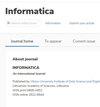An Automated Python Script for Data Cleaning and Labeling using Machine Learning Technique
IF 2.8
4区 计算机科学
Q2 COMPUTER SCIENCE, INFORMATION SYSTEMS
引用次数: 0
Abstract
was to obtain a financial dataset from the top database, "Kaggle". Create a machine learning (ML) approach in Python that intends to automate the financial dataset cleaning. This covers ingesting data, addressing incomplete data, addressing anomalies, one-hot wrapping and label encoding, extracting date and time values, and data normalization. Implementing an unsupervised machine learning method that attempts to automate financial dataset labeling (k-means). Using the method includes the elbow principle, k-means clustering, data modeling of "age" versus "arrival," dimensionality reductions, computer vision, and dataset categorizing using the groupings. An e mpirical assessment of the cleaned and labeled automated trading dataset utilizing a comparison of the cleaned dataset before and after PCA adoption. The results show that the developed ML technique not only improved the performance of the audit data used in this study, but also classified the data after cleaning it and removing the unpleasant section and incomplete data, as shown by the k-means segmentation result and grouping by PCA.使用机器学习技术进行数据清理和标记的自动Python脚本
是从顶级数据库“Kaggle”中获得一个金融数据集。在Python中创建一种机器学习(ML)方法,旨在自动化金融数据集清理。这包括接收数据、处理不完整数据、处理异常、一次热包装和标签编码、提取日期和时间值以及数据规范化。实现了一种无监督的机器学习方法,该方法试图自动化金融数据集标记(k-means)。使用该方法包括肘部原理、k-means聚类、“年龄”与“到达”的数据建模、降维、计算机视觉和使用分组的数据集分类。利用PCA采用前后清洁数据集的比较,对清洁和标记的自动交易数据集进行实证评估。结果表明,所开发的ML技术不仅提高了本研究中使用的审计数据的性能,而且在清理数据并去除不愉快的部分和不完整的数据后对数据进行了分类,如k-means分割结果和PCA分组所示。
本文章由计算机程序翻译,如有差异,请以英文原文为准。
求助全文
约1分钟内获得全文
求助全文
来源期刊

Informatica
工程技术-计算机:信息系统
CiteScore
5.90
自引率
6.90%
发文量
19
审稿时长
12 months
期刊介绍:
The quarterly journal Informatica provides an international forum for high-quality original research and publishes papers on mathematical simulation and optimization, recognition and control, programming theory and systems, automation systems and elements. Informatica provides a multidisciplinary forum for scientists and engineers involved in research and design including experts who implement and manage information systems applications.
 求助内容:
求助内容: 应助结果提醒方式:
应助结果提醒方式:


